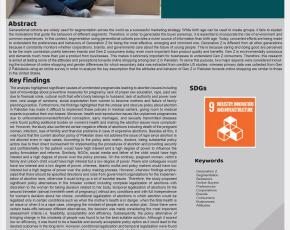Abstract
Generational cohorts are widely used for segmentation across the world as a successful marketing strategy. While birth age can be used to create groups, it fails to explain the motivations that guide the behaviors of different segments. Therefore, in order to generalize the buyer personas, it is essential to incorporate the role of environment and common experiences. In this context, segmentation using generational cohorts provides a richer source of information than birth age. Today, concerted efforts are being made to understand the preferences and behaviors of Generation Z for being the most effective, emerging and imminent one. Generation Z is different from all other generations because it constantly monitors whether corporations, brands, and governments care about the future of young people. This is because caring and doing good are perceived to be the main connection points between brands and Gen Z consumers today, even more important than product quality and benefits. Gen Z is environmentally conscious and demands much more than just a product from businesses. This makes it extremely important for businesses to understand Gen Z consumers. Therefore, this research is aimed at testing some of the attitudes and perceptions towards online shopping among Gen Z in Pakistan. To serve this purpose, two major aspects were considered including the incidence of online shopping and gender differences for which secondary data was extracted from credible US studies, whereas primary data was collected from Gen Z Pakistanis using an online survey in order to analyze the key assumption that the attitudes and behavior of Gen Z in Pakistan towards online shopping are similar to those in the United States.
Key findings
The results of the survey indicated no major differences in the Gen Z individuals from Lahore, Pakistan and their counterparts from the US which supported the initial assumption. Moreover, it was found that about 40% of the respondents spend 5-6 hours browsing the internet every day, making it reasonable to assume that the more time they spent, the greater would be the chances of browsing through the online stores. In contrast to their US counterparts, an equal number of people were found to be shopping online and in physical stores in Pakistan. However, 41 % of respondents agreed that online shopping saves time like it did for 53% of the US based Gen Z respondents. The most common categories of goods that Gen Z preferred to shop online were clothing and groceries. Furthermore, the results showed that 33% of Pakistani respondents found it difficult to search online for what they need, just like the 38% of Gen Z respondents from the US. Similarly, the research statistics showed that 47% of the US based Gen Z customers found online ads to be helpful in learning about new products. 97% were found to prefer social media, 78% prefer friends and family, and 64% prefer celebrities and influencers while making purchase decisions. 22% of Gen Zers were found preventing online purchases and 24% prevented in-store purchases due to poor experiences. 26% of Gen Z participants found deliveries convenient whereas 24% usually bought hard-to-find items online. Moreover, 58% of US based Gen Z felt that online shopping disconnects them from social media. All these findings were found to be complimenting the results of the survey conducted in Pakistani context.
Implications
The study suggests that by understanding and using cohort analysis, businesses can identify target markets with greater precision to get new customers, especially small-business owners who are better off aiming for narrow target markets. Furthermore, the generation Z population in Pakistan is important for brands and businesses because it makes up a considerable chunk of the population which creates an opportunity for businesses to modify their offerings to serve the highly tech-savvy and informed individuals who have access to a multitude of information sources. Moreover, the proven assumption, that the online shopping patterns of Gen Z individuals in Pakistan are almost similar to that of their US counterparts could also help in leveraging US-based attitude and behavior data for Pakistani brands and businesses.













